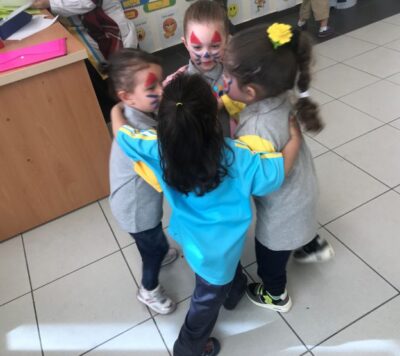- Home
- About HIS
- Academics
- Student Life
- Student Affairs
- HR
- Media

Early Years Program
HIS is an authorized International Baccalaureate (IB) School, implementing the Primary Years Programme (PYP).
PYP is an international curriculum framework designed for students between the ages of 3 and 12 years. The IB-PYP is a dynamic and flexible program which allows teachers to encourage and develop each child’s individual interests. It focuses on the overall growth of a developing child and addresses a student’s academic, social and emotional well-being. It encourages learners to develop independence and to take responsibility for their own learning. PYP also supports student efforts to gain an understanding of the world and to function comfortably and confidently within it. It helps learners establish their personal values as a foundation upon which a more international mindset can develop and flourish. The program offers a comprehensive, inquiry-based approach to teaching and learning. It provides guidelines related to student learning styles, teaching methodologies and assessment strategies.
The PYP curriculum framework is an expression and extension of three inter-related questions:
“What do we want to learn?”
“How best can we learn?”
“How will we know what we have learned?”
HIS defines Early Years as those between the ages of 3 to 6 years old, divided into 3 age-groups:
3-4: Early Years I
4-5: Early Years II
5- 6: Early Years III
The PYP in the early years acknowledges that young children are in the process of building new knowledge through investigation and therefore provides a framework that supports them to become active learners thereby developing their curiosity. HIS Early Years curriculum relies heavily on a play-based learning approach. Early Years students make use of both indoor and outdoor facilities to comfortably interact within different surroundings, openly express themselves, and satisfy their natural curiosity. Teachers use these opportunities to reinforce communication, research, thinking, management and social skills.
Early Years Classes inquire into four trans-disciplinary themes.
– Who We Are
– How We Express Ourselves
– How the World Works
– Sharing the Planet
In addition to the above, EYIII classes might further inquire into two more trans-disciplinary themes:
– Where We Are in Place and Time
– How We Organize Ourselves
Under each theme, EY students delve into one unit of inquiry which is either science driven or social studies driven. Conceptual lenses and disciplinary subject areas ensure a deeper understanding of the units of inquiry and develops student literacy; artistic perspective; personal, social, and physical development; as well as mathematical and reasoning concepts and skills.